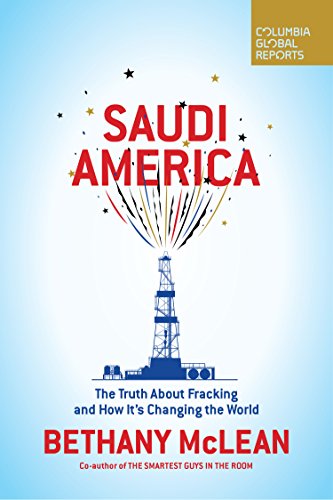You have /5 articles left.
Sign up for a free account or log in.
 Saudi America: The Truth About Fracking and How It's Changing the World by Bethany McLean
Saudi America: The Truth About Fracking and How It's Changing the World by Bethany McLean
Published in September of 2018.
Unfortunately, the big news in energy is not about renewables. It is not solar panels or windmills or batteries.
The big news is fracking.
The fact that the big story in energy is the discovery of how to unleash gas and oil from previously inaccessible geological formations is either a wonderful story of progress and independence or a horrible story of environmental degradation. It just depends who you ask.
In Saudi America, Bethany McLean sidesteps the environmental question of fracking. Nobody on either side of that issue is likely to be convinced about the level of environmental risk posed by hydraulic fracturing.
Instead, McLean investigates what fracking is likely to mean for the future of US energy. McLean comes to two interesting conclusions.
The first conclusion is about oil. It turns out that fracked oil is expensive oil. The growth in US domestic oil production in the last decade from fracking was mostly the result of high oil prices and low interest rates. Energy companies were able to borrow huge sums to pull the energy out of the ground. As soon as the price of oil dips or interest rates rise, shale oil becomes a bad economic bet.
What this means is that as long as Saudi Arabia can keep pumping oil out of its sands that the US will likely buy Saudi oil. The goal of US oil independence will not be met by US production. Domestic oil sources are not large enough, and what is available is expensive to pump. At best, oil developed from hydraulic fracturing will moderate prices on the world oil market.
The other conclusion from Saudi America is about gas. Natural gas is now the leading generator of electricity in the US, just beating out coal at 32% vs. 30%. The next closest source of US electrical power is nuclear at 20%. Renewables only account for about 17% of all electricity produced, with hydro (7.5% of total) contributing the most. Solar only produces 1.3% of total electricity.
While fracking will not make the US oil independent, the gas produced by fracking may be a bridge to renewable electricity generation. Cheap and abundant natural gas not only burns cleaner than coal, it can also generate electricity when the sun is not shining and the wind is not blowing. Gas-fired electricity generation plants can supplement a renewable-first energy strategy.
What might all this mean for higher education?
If we are serious about transitioning to renewables, then we need to have a serious conversation about fracking. We may not like it, but fracking may be the method that gets us to a renewable future.
This is not an argument for or against hydraulic fracturing. Rather, higher education should be part of the larger conversation around the future of US energy. We should be talking as much about fracking as we are about solar panels.
Saudi America is as good a book as any to get that campus energy conversation going.
Can you recommend some other good books on energy?
Has anyone written a book about how colleges and universities produce and use energy?
I liked Meghan L. O’Sullivan’s 2017 Windfall: How the New Energy Abundance Upends Global Politics and Strengthens America’s Power. Also check out the excellent Boom: How Fracking Ignited the American Energy Revolution and Changed the World.
Other books that I’ve read to try to make sense of our energy future include Energy and Civilization: A History by Vaclav Smil and Energy: A Human History by Richard Rhodes.
Other energy books to recommend?
What are you reading?








